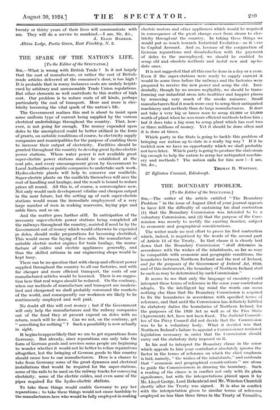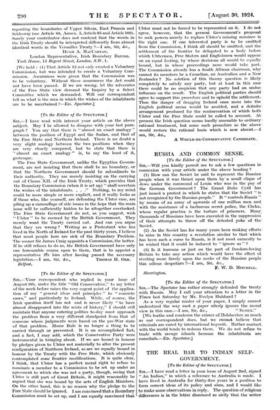THE BOUNDARY PROBLEM. [To the . Editor'of the SPECTATOR.]
Sm,—The writer of the article entitled "The Boundary Problem " in the issue of August 23rd of your journal appears to have felt the difficulty of sustaining his dual contention (1) that the Boundary Commission was intended to Le a voluntary Commission, and (2) that the purpose of the Com- mission was merely to rectify the existing frontier, subject to economic and geographical considerations. -
The writer made no real effort to prove his first contention which, indeed, is negatived by the words of the second part of Article 12 of the Treaty. In that clause it is clearly laid down that the Boundary Commission "shall determine in accordance with the wishes of the inhabitants, so far as may be compatible with economic and geographic conditions, the boundaries between Northern Ireland and the rest of Ireland, and for the purposes of the Government of Ireland Act, 1920, and of this instrument, the boundary of Northern Ireland shall be such as may be determined by such Commission." • It seems to me that only the language of casuistry could' interpret these terms of reference in the sense your contributor adopts. To the intelligent lay mind the words can mean nothing else than that the Boundary Commission is required* to fix the boundaries in accordance with specified terms of reference, and that until the Commission has definitely fulfilled its statutory duties the boundaries of Northern Ireland, for. the purposes of the 1920 Act as well as of the Free State (Agreement) Act, have not been fixed. The Judicial Commit- tee of the Privy Council did not decide that the Commission • was to be a voluntary body. What it decided was that, Northern Ireland's failure to appoint a Commissioner rendered legislation necessary in order that the Commission should- carry out the statutory duty imposed on it.
In his zeal to interpret the Boundary clause in the sense which appeals to him your contributor absolutely ignores the factor in the terms of reference on which the chief emphasis- is laid, namely, "the wishes of the inhabitants," and contends that "economic and geographical considerations" are alone to guide the Commissioners in drawing the boundary. Such a reading of the clause is in conflict not only with its plain . significance, but with the interpretations placed upon it by Mr. Lloyd George, Lord Birkenhead and Mr. Winston Churchill shortly after the Treaty was signed. It is also in conflict with the interpretation given to similar terms of reference employed no less than three times in the Treaty of Versailles,
regarding the boundaries of Upper Silesia, East Prussia and Schleswig (see Article 88, Annex. 5, Article 95 and Article109). Surely your contributor does not contend that the words in the Irish Treaty should be interpreted differently from almost identical words in the Versailles Treaty ?—I am, Sir, &c.,
HUGH A. MACCARTAN, London Representative, Irish Boundary Bureau. York House, 15 Regent Street, London, S.W.1.
[We hold : (1) That Article 12 not only created a Voluntary Commission, but -was intended to create a Voluntary Com- mission. Assurances were given that the Commission was to be voluntary. Without those assurances the Act could not have been passed. If we are wrong, let the advocates of the Free State view demand the Inquiry by a Select Committee which we demanded. Will our correspondent tell us what is the area in which the wishes of the inhabitants are to be ascertained ?—En. Spectator.]



































 Previous page
Previous page